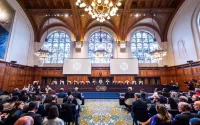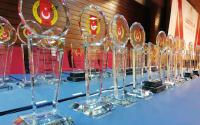12 September 2004USINFO.STATE.GOV
U.S. to participate in sessions of carbon sequestration group
Deputy Secretary of Energy Kyle McSlarrow will represent the United States at a ministerial meeting of the Carbon Sequestration Leadership Forum scheduled for September 13-15 in Melbourne, Australia, the Department of Energy said in a press release issued September 10.
The forum is an international climate change initiative that focuses on developing the means to capture and store carbon to prevent greenhouse gases from entering the atmosphere, a process McSlarrow said is "of vital importance" if the world is to safely continue its heavy reliance on coal as an energy source.
Following is the text of the press release:
U.S. to Participate in Second Ministerial Meeting of the Carbon Sequestration Leadership Forum
WASHINGTON, DC -- The Carbon Sequestration Leadership Forum (CSLF), an international climate change initiative that focuses on the development of carbon capture and storage technologies, will hold a ministerial meeting in Melbourne, Australia, September 13-15, 2004. Kyle McSlarrow, Deputy Secretary of Energy, will represent the United States.
"Our emphasis on carbon sequestration is of vital importance as the world's economies continue to expand," Deputy Secretary McSlarrow said. "Coal is one of the world's most plentiful energy resources, and one of its cheapest, so it is in our best interest to emphasize the capture and permanent isolation of gases that otherwise could contribute to global climate change. Affordable and environmentally safe sequestration approaches could offer a way to stabilize atmospheric levels of carbon dioxide without requiring large-scale and potentially costly changes to our respective energy infrastructures."
Underlying the many activities undertaken by the CSLF since its inaugural meeting in June 2003 is the recognition by all 16 Members that there are immense coal reserves in the world, that coal remains a relatively cheap source of energy, and that fossil fuels will continue to be widely used during the first half of this century if not beyond. Thus, CSLF members view it as imperative to develop and deploy cost-effective technologies with the potential to substantially reduce, avoid, or sequester future greenhouse gas emissions before they enter the atmosphere.
The shared vision is to advance "transformational" technologies that improve the way we produce, distribute, store, convert, and use energy with the dual goals of providing the energy necessary for continued economic growth while at the same time reducing greenhouse gas emissions.
In Melbourne, ministers will consider for approval the 10 carbon capture and storage projects presented at the second meeting of the CSLF's Policy and Technical Groups held in Rome, Italy, in January 2004. The Ministers will also consider whether to approve a Technical Roadmap that provides future directions for activities through the CSLF.
CSLF Members have also been invited to participate in the U.S. FutureGen project, a $1 billion initiative to design and construct the first emission-free coal-fired power plant that will produce energy, capture and store emissions and also produce hydrogen.
Along with developments in other technologies, carbon capture and storage holds the promise of allowing the world to consume fossil fuels sustainably over the coming decades, and to lay the foundations for a potential post-petroleum era of zero net emissions.
The CSLF is part of a portfolio of international energy technology partnerships spearheaded by the United States both to enhance energy security and address climate change. In July 2004 the United States announced the Methane to Markets Partnership, which brings together both developed and developing countries to initiate and promote cooperation on the recovery and use of methane.
Other partnerships to reduce emissions and promote sustainable development include the International Partnership for the Hydrogen Economy, a multilateral initiative involving 16 partners expanding research into hydrogen energy technologies; Gen IV, a program involving 11 international partners working on new fission reactor designs; and the International Thermonuclear Experimental Reactor (ITER) nuclear fusion project.






